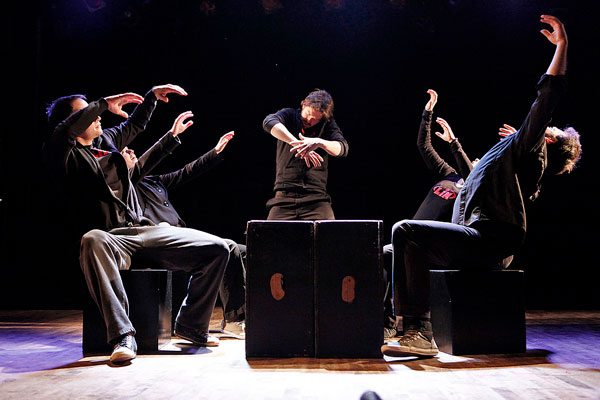
February 7, 2018; Paste
Late in 2016, NPQ reported on a crisis at a theater company in Orlando that was not paying its actors, which was actually symptomatic of a larger financial problem. We are delighted to share a report from Paste Magazine on an organization going in the opposite direction, making it a point to pay performers even though they are often ready to do it for free.
The HUGE Theater in Minneapolis isn’t just creating a vibrant improv scene in that city; they’re also making a point. They want their audiences and the performers to know that improv is a professional pursuit and that it needs to involve pay, both for the ticket and for the performers.
The whole idea of improv is new to Minneapolis, according to Butch Roy, HUGE’s cofounder and executive director. “We are not Chicago,” he says, “…yet.” In the few short years the theater has been open, the number of performers has grown from a handful to what Roy projects as in the thousands. They offer a limited number of shows per week, with one or two shows most days and three shows on Friday and Saturday. They also have an improv class, for which they charge $220.
HUGE emerged as a nonprofit in 2009, and by 2010 had begun fundraising. They have received funding from the Minnesota State Arts Board and the McKnight Foundation. Their annual fundraiser is a marathon improv performance, which this year lasted 28 hours and raised $60,000 in one day. (Roy does not comment on how much the event cost, though, so we do not know what the actual net was.) Their 2015 IRS Form 990 shows their annual revenue at $537,000 and expenses at $450,000, so it is not a miniscule operation.
Sign up for our free newsletters
Subscribe to NPQ's newsletters to have our top stories delivered directly to your inbox.
By signing up, you agree to our privacy policy and terms of use, and to receive messages from NPQ and our partners.
In the Paste interview, Roy argues that one of the most important aspects of what they do is make sure that everyone involved knows this is a professional organization, and that improv is a comedic art form that should be taken seriously. The ticket prices are low, running from $5 to $10, and the theater itself is small, with only 100 seats. However, at the magic moment of selling 71 tickets, the performers will be paid—$150 or $75, depending on the time slot, which presumably is divided among the performers in that show. If the performance does not meet the sales threshold, they will be offered a flat fee for a two-month run.
Roy comments that some of the hurdles they have faced as they do this come from a surprising place: the performers themselves. There apparently have been a number of performers who were perfectly willing to work for free, or to turn the fee back to the theater as a way of helping to build this new organization. The theater’s mission is to serve the performers themselves, not the community of Minneapolis as a whole. So, says Roy, “It’s actually really important that they learn not only to get paid as artists, but that they should be paid as artists. And don’t expect any less.”
Similarly, if someone contacts the theater asking for free entertainment, HUGE will not respond. They do not even contact performers to share the unpaid opportunity as a way of getting visibility. Instead, they will respond to the request with “language about why that practice is corrosive and destructive to artists. So, we’re trying to get the word out.”
HUGE is building a base in a community where it had not existed, and for this, they are to be applauded. However, in conclusion, we offer a parting thought to the HUGE Theater. Although they were not paid a great deal of money ($24,000 in 2015), two lead staff—Roy, and the Education Director Jill Bernard—are listed as serving on the board, with Roy assuming the role of board secretary. Two other staff, the artistic director and managing director (who were listed as part-time in 2015), are also on the board. Having a complete overlap of staff and board like this is often frowned upon, and although it is very common in a startup, being seven years old and with a budget of almost a half-million, the organization might want to approach their board service with the same seriousness they use with performers: This is a meaningful and important role that involves objectivity and oversight, and should be treated that way.—Rob Meiksins











